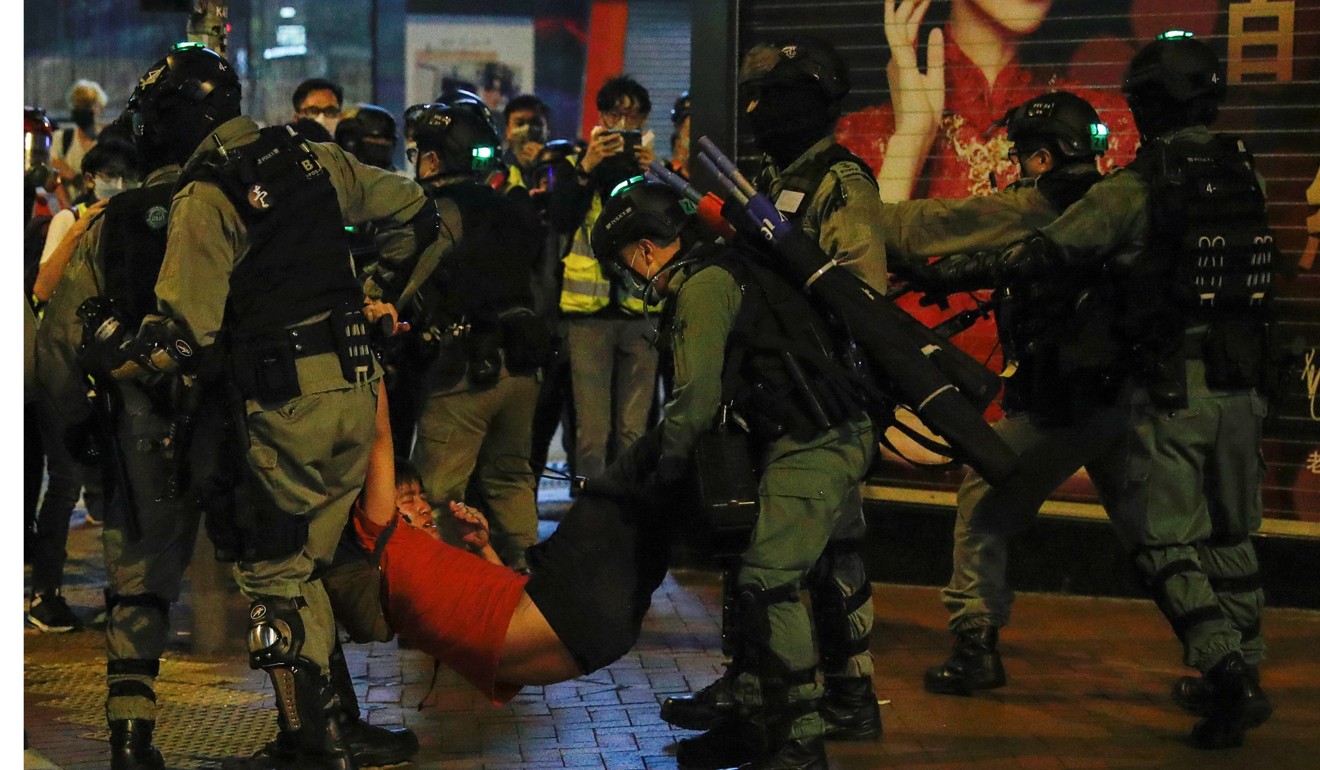
Hong Kong protests show Singapore’s ‘zero tolerance’ for illegal demonstrations is right move: minister K Shanmugam
- The home minister said the ‘actions of a disaffected few should not be allowed to threaten the rights of the majority’
- He also said strict policing and laws would not keep people off the streets if they believed the ‘system is fundamentally unfair’
K Shanmugam, who is also the law minister, said members of Hong Kong’s police force faced international and domestic public criticism even as they fended off protesters who were using increasingly violent and disruptive tactics. The lesson for Singapore, he said in Parliament, was that “there has to be a zero tolerance approach to illegal demonstrations and protests”.
“The actions of a disaffected few should not be allowed to threaten the rights of the majority to live in a stable, peaceful society,” Shanmugan said, citing other similar protests that have erupted around the world in the past year, including those in Chile and Lebanon.

The operating expenditure for MHA increased by about S$439 million (US$315 million), or 7.7 per cent, to enhance the ministry’s ability to deal with heightened security threats, with the police force taking up the largest share of the pie, at 53 per cent.
Members of parliament on Monday fielded questions ranging from new technologies deployed by the police to how Singapore would manage security risks such as riots, and what lessons the city state could draw from protests elsewhere.
The demonstrations were initially peaceful, but protesters – mostly made up of youths – grew increasingly violent after their demands were not met. Clashes intensified, with protesters hurling bricks and starting fires and the police stepping up their use of tear gas and pepper spray.

Shanmugam drew comparisons between the police forces in the two cities, saying they were both “very highly regarded forces in Asia” before the protests erupted.
“But since the protests started, the [Hong Kong] police have been caught between the need to uphold public order and protesters who resorted to increasingly violent tactics just to attack the police and instigate them,” he said, adding that this has severely damaged the relationship between the police and the Hong Kong public.
Police arrest 115 after biggest outbreak of protest violence since coronavirus crisis
This was further fuelled by the “one-sided portrayal” of the situation by the international media, which focused on criticising the police force, added Shanmugam.
For example, the media often referred to demonstrators in a positive light as pro-democracy protesters, while the police were singled out for their brutal response.
“That the police were being attacked, their lives were frequently in danger, their families were being exposed, all that was ignored,” said Shanmugam, in defence of the Hong Kong police.
Meanwhile, Hong Kong’s police chief Chris Tang Ping-keung on Monday defended the need to drastically increase the force’s budget to increase personnel and weapons, saying it had to counter the “new normal” of petrol bombs throwing and potential local terrorism.
In Hong Kong’s 2020-21 budget unveiled last week, HK$21.9 billion was earmarked to boost the headcount by 2,543 and HK$612 million was granted for “specialist supplies and equipment”.
The budget also revealed that overtime pay and allowances for police in the previous financial year soared to HK$2.5 billion (US$321 million), 10 times the original estimate.
Where do we draw the line? How many protesters are acceptable? How do we tell a peaceful protest and what will escalate into violence?
Shanmugam also spoke about Singapore’s approach to handling protests, such as its Public Order Act, under which a police permit has to be obtained before citizens can hold a demonstration.
Singapore only has one free speech site – the Speakers’ Corner in Hong Lim Park – but even so, a permit is required should foreigners be involved, or if race and religion are discussed as part of the protest.
Shanmugam said that while some countries have disagreed with Singapore’s approach and argued that the freedom to protest is part of freedom of expression and should not be hindered, it would be hard to manage otherwise.

“Where do we draw the line? How many protesters are acceptable? How do we tell a peaceful protest and what will escalate into violence?” he asked.
“Part of the issue in Hong Kong is that protests are allowed [and the] police are only allowed to intervene when it turns violent … This sets up the police for failure.”
Hong Kong could have had the best police force in the world, but Singapore took a “correct” approach by being strict about where its people can protest, which meant that the city state’s police force would not be put in an “impossible position”.
Singapore also vulnerable to protests that have left Hong Kong at ‘breaking point’: minister
Shanmugam also said that such protests cannot be quelled only using strict laws.
Underlying these demonstrations could be issues related to inequality levels or social injustice, which led to people not supporting the system, he said.
“If a significant section of your population believes that the system is fundamentally unfair … and that it is set up to benefit a few at the expense of the majority, then no amount of strict policing and strict laws are going to keep people off the streets,” Shanmugam said.

